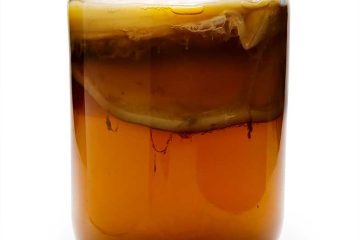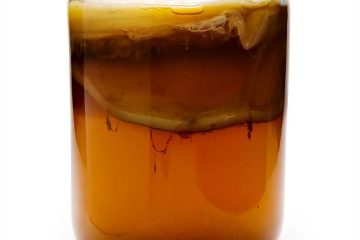The Potential Side Effects of Drinking Kombucha Tea: What You Need to Know

The Potential Side Effects of Drinking Kombucha Tea: What You Need to Know
Kombucha tea has gained popularity in recent years for its potential health benefits, including improved digestion, increased energy, and a stronger immune system. The fermented drink is made from tea, sugar, bacteria, and yeast, and is often touted as a natural remedy for a variety of health issues. However, like any product, kombucha tea also has potential side effects that consumers should be aware of before incorporating it into their daily routine.
In this article, we will explore the potential side effects of drinking kombucha tea, what you need to know about them, and how to enjoy kombucha tea responsibly. We’ll also provide tips on how to mitigate these potential side effects and make informed decisions about adding kombucha tea to your diet.
Understanding Kombucha Tea
Before delving into the potential side effects of kombucha tea, it’s important to understand what it is and how it’s made. Kombucha is a fermented tea that has been consumed for centuries, with origins in China and later spreading to other parts of Asia and Europe. The fermentation process involves a symbiotic culture of bacteria and yeast, known as SCOBY, which is added to sweetened tea and left to ferment for a period of time.
During the fermentation process, the SCOBY consumes the sugar in the tea and produces a variety of compounds, including organic acids, probiotics, and antioxidants. These compounds are thought to contribute to the potential health benefits of kombucha tea, such as improved gut health, boosted immunity, and increased energy levels.
Potential Side Effects of Drinking Kombucha Tea
While kombucha tea is generally considered safe for most people when consumed in moderation, there are potential side effects that individuals should be aware of. These side effects can be attributed to a variety of factors, including the fermentation process, the presence of certain compounds, and individual sensitivities. Some potential side effects of drinking kombucha tea include:
1. Digestive Issues: Some individuals may experience digestive discomfort, such as bloating, gas, or stomach pain, after consuming kombucha tea. This may be due to the presence of organic acids, such as acetic acid and lactic acid, which can affect the pH balance in the digestive system.
2. Allergic Reactions: Kombucha tea contains trace amounts of alcohol and small amounts of residual sugar, which can trigger allergic reactions in some individuals. Common symptoms of allergic reactions may include hives, itching, swelling, or difficulty breathing.
3. Overconsumption of Sugar: While the fermentation process reduces the sugar content in kombucha tea, some commercial varieties may still contain high levels of added sugars. Overconsumption of sugar can lead to a variety of health issues, including weight gain, insulin resistance, and dental problems.
4. Risk of Contamination: Kombucha tea is a fermented beverage, which means there is a potential risk of contamination with harmful bacteria or mold. Improper brewing or storage conditions can increase the risk of contamination, leading to the potential for foodborne illness.
5. Interactions with Medications: Some components of kombucha tea, such as organic acids and probiotics, may interact with certain medications, such as antibiotics, blood thinners, or immune-suppressing drugs. These interactions can affect the efficacy of the medications and lead to potential health complications.
Managing Potential Side Effects
It’s important to note that the potential side effects of drinking kombucha tea are not experienced by everyone, and many individuals may consume kombucha tea without any adverse effects. However, if you are considering adding kombucha tea to your diet, there are several steps you can take to manage and mitigate potential side effects:
1. Start Slowly: If you are new to consuming kombucha tea, start with small servings to gauge your body’s response. Gradually increase the amount consumed over time to allow your body to adjust to the compounds in the tea.
2. Choose Quality Brands: When purchasing kombucha tea, opt for reputable and quality brands that adhere to proper brewing, fermentation, and storage practices. Look for products that have been tested for contaminants and undergo regular quality control measures.
3. Monitor Sugar Content: Be mindful of the sugar content in kombucha tea and choose varieties that have lower sugar levels. Pay attention to the ingredient list and opt for brands that use natural sweeteners or minimal added sugars.
4. Address Allergies: If you have known allergies to alcohol or sugar, it’s important to consult with a healthcare professional before incorporating kombucha tea into your diet. They can provide guidance on potential risks and help you determine if kombucha tea is safe for you to consume.
5. Seek Medical Advice: If you have underlying health conditions or are taking medications, consult with a healthcare professional before consuming kombucha tea. They can assess your individual risk factors and provide personalized recommendations based on your health status.
Overall, being informed about the potential side effects of drinking kombucha tea and taking proactive measures to mitigate these risks is essential for a safe and enjoyable experience with this fermented beverage.
In Conclusion
Kombucha tea has gained popularity for its potential health benefits, but it’s important to be aware of the potential side effects associated with its consumption. Digestive issues, allergic reactions, overconsumption of sugar, risk of contamination, and interactions with medications are all potential side effects that individuals should consider before adding kombucha tea to their diet.
By starting slowly, choosing quality brands, monitoring sugar content, addressing allergies, and seeking medical advice when necessary, individuals can make informed decisions about consuming kombucha tea and minimize potential side effects. Ultimately, being aware of these potential side effects and taking proactive steps to manage them can help individuals enjoy the potential benefits of kombucha tea while minimizing the risks.
[elementor-template id=”430″]
[elementor-template id=”433″]




0 Comments